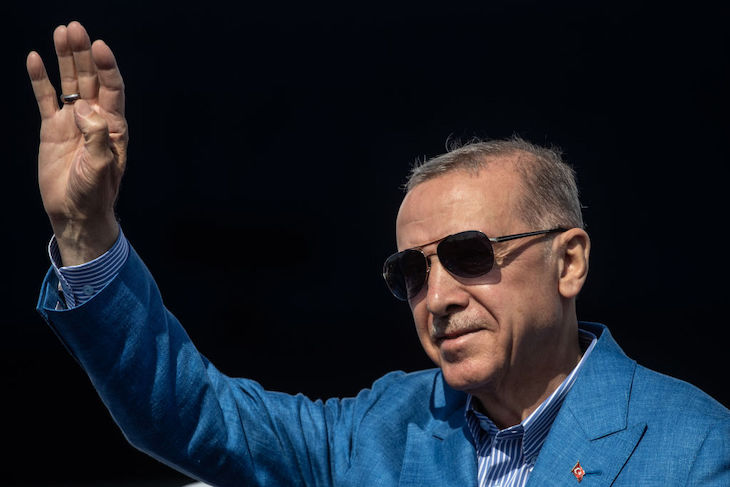With only a few days to go until Turkey’s election, the opposition continues to lead in most polls. But there is a growing feeling in Turkey that president Erdogan might defy the odds and win again. A striking image of a rally in Istanbul – Erdogan’s biggest so far – shows Turkey’s leader continues to enjoy popular support.
The ruling Justice and Development Party (AKP) claimed that 1.7 million people showed up at the decommissioned Atatürk airport for the event on Sunday; supporters were bused into the rally from across the country. While independent fact-checkers pointed out that the real number is likely less than half the number claimed, this rally showed that victory for the opposition is far from certain.
Just a day before, the six-party opposition alliance also held its respective rally in Istanbul attracting several hundred thousand supporters. The contrast in theme and rhetoric between the two events was stark. The opposition’s messaging centres around peace, unity, and democracy; Erdogan has been focusing on legacy, national security, and Islam.

Islamism has always played a central role in AKP’s two-decades-long rule, but the packaging has changed considerably over the years. At the time of their first electoral victory in 2002, they were advocating a rather liberal form of Islamism. Over the second decade of their rule, however, as they lost the sympathy of centrists, liberals, Kurds, and the European Union alike, Erdogan embarked on a new path, successfully merging Islamism with hardline nationalism. This combination has time and again worked very well in winning the support of the more conservative central Anatolia region.
Erdogan has been at pains to present this election as a choice between Islam and atheism
The phrase ‘geography is destiny’ is rather popular in Turkey and for good reason. When people in Turkey meet a new person, they almost immediately ask: ‘Where are you from?’, meaning which province is your father’s family is originally from. From the answer, one can quite accurately guess the person’s religious and ethnic background, their voting intentions, and, in some cases, even their lifestyle. With the exception of a few swing constituencies, like Istanbul, Ankara, or Adana, this has been well reflected in the results of the last few elections. The west of the country, along the Aegean and Mediterranean coasts, is red and supports the secularist Republican People’s Party (CHP); the southeast is purple, for the pro-Kurdish Democratic People’s Party (HDP); everything in-between is orange for Erdogan’s AKP.
Erdogan has been at pains to present this election as a choice between Islam and atheism. ‘There will be one of two scenarios in Turkey on May 14,’ the justice minister, Bekir Bozdag, said at a recent election event. ‘We will see either people popping champagne and celebrating until the evening or people performing pure prayers of gratitude.’ The fact that the opposition’s joint candidate, Kemal Kilicdaroglu, is of the heterodox Alevi Muslim minority background also aggravates their chances of winning over the hearts of the conservative electorate in central Anatolia.
The pitiful state of the Turkish economy is no secret. Inflation is still officially at 44 per cent and large segments of society fell below the poverty line since 2018. Even AKP supporters are starting to admit there are serious problems. ‘But if someone is going to fix it, it will be them,’ said Mahmut Ozturk, a pensioner who has supported AKP since their foundation. He pointed out the mega projects and constructions that have been the backbone of the economic growth presided over by the AKP. Even in the current economic crisis, Turkey’s GDP is still three times higher than when Erdogan first came to power.
The unofficial economic relations and dynamics in Turkey are also crucial when it comes to understanding how Erdogan maintains such high support. Due to the lack of a sufficient social welfare system, people in the country heavily rely on informal economic networks. Finding a new job, an affordable flat, or a business partner is often sorted out through political parties or religious sects. With over 11 million members, AKP is currently the biggest and most important of such groups.
‘If you want your business to succeed, you have to join them,’ said a high-ranking AKP official and businessman, who wished to remain anonymous. Although he is the party’s regional manager in a southern Turkish region, his association with AKP is primarily a pragmatic position, not ideological.
Erdogan has focused extensively on defence and national security during his campaign. In the run-up to the election, he launched Turkey’s first ‘drone carrier’ warship and a new combat drone. The military technology further reinforced his image as the hawkish strongman who prioritises the national sovereignty of Turkey above all.
AKP has gone out of its way to frame the opposition as an ally of terrorist organisations. It does so by using the widespread support the opposition’s candidate, Kemal Kilicdaroglu, gained in the Kurdish movement, against him. During his rally on Sunday, Erdogan screened a heavily-edited deepfake video that showed members of the outlawed Kurdistan Workers’ Party (PKK) endorsing Kilicdaroglu. ‘Would you vote for these?’ Erdogan asked.
It didn’t take long for Erdogan’s divisive rhetoric to take effect. Later that afternoon, Istanbul’s opposition mayor, Ekrem Imamoglu, held a rally in Erzurum, a central Anatolian region. The event was cut short by a mob of several hundred people who threw bricks at him and his supporters, injuring many. Instead of immediately condemning the provocation, AKP’s Erzurum MP Mehmet Emin Oz tweeted: ‘You are worthy of every praise, Erzurum’. The huge turnout at Erdogan’s rally, and the incident at the opposition’s rally on Sunday, are a clear indication that the ruling party still has vast support among the electorate. Some are willing to resort to radical tactics to secure another five years for AKP.






Comments